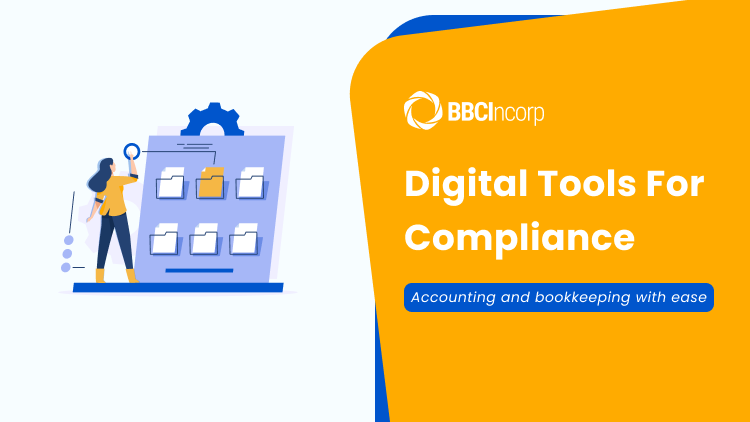
Digital tools for bookkeeping and accounting are transforming how businesses manage their finances, ushering in an era of increased efficiency and accuracy.
In today’s fast-paced business environment, where efficiency and compliance are critical, leveraging digital solutions is essential. These tools streamline financial processes, ensuring precise adherence to regulatory requirements while optimizing overall operations.
As businesses strive for growth and operational excellence, integrating advanced software into their bookkeeping practices can provide significant advantages. Then, what strategic investments should you make to simplify these standard operations?
Understanding compliance in bookkeeping
Navigating compliance in bookkeeping extends beyond maintaining accurate records. It involves adhering to a comprehensive framework of laws and regulations designed for financial integrity — a requirement especially relevant in jurisdictions with a simple tax system in Hong Kong is known for.
One of the key standards in this framework is the International Financial Reporting Standards (IFRS). The IFRS sets out guidelines for how financial transactions should be reported, aiming to achieve transparency and consistency across financial statements globally.
Every jurisdiction is bound to have its own bookkeeping and accounting standards, so it’s important to study all relevant legislation. For businesses operating in Hong Kong, for example, compliance also extends to employment-related rules under the HK Employment Ordinance, which informs payroll, reporting, and HR-related bookkeeping.
However, there are a few critical requirements for general compliance:
- Precise financial reporting: Making sure that financial statements accurately reflect a company’s financial position and performance.
- Comprehensive management accounts: Regularly updating and reviewing administration accounts to provide insights into financial health and operational efficiency—an essential practice that supports effective business record keeping.
- Punctual annual tax filings: Submitting tax returns and related documents in a timely manner to comply with tax regulations and avoid penalties.
Despite its importance, maintaining compliance presents several challenges. To exemplify, the complex nature of regulations, combined with the vast amounts of data businesses must manage, can be daunting—especially for companies in fast-growing sectors like trade, where the best logistics and account management for trading businesses can directly influence the accuracy of financial records.

Manual bookkeeping processes are prone to errors and inconsistencies, which increase the risk of non-compliance. Additionally, resource constraints can make it difficult for businesses to keep up with evolving regulations and requirements.
Just as strategic investments require meticulous planning and execution, managing compliance demands a thorough approach. Embracing digital tools can significantly alleviate these challenges, enabling businesses to stay compliant while focusing on their core operations.
The role of digital tools in ensuring compliance
Digital tools are revolutionizing traditional bookkeeping practices by introducing a new level of efficiency. Here’s how these innovations enhance compliance efforts:
Reduction of human error
Automated calculations and data entry minimize mistakes inherent in manual processes. This consistency across financial records makes sure that reports and documents align with regulatory standards.
Real-time monitoring and reporting
Advanced tools provide instant insights into financial data, allowing businesses to identify and address potential issues before they escalate. Real-time reporting helps guarantee that financial information is current and accurate.

Secure storage and retrieval
Digital solutions offer secure methods for storing and retrieving financial information. This not only protects sensitive data but also makes it easily accessible when needed, supporting efficient compliance.
By embracing these digital solutions, businesses can streamline their bookkeeping practices and remain compliant while focusing on their core operations. As careful investment strategies drive growth, leveraging these advanced tools can enhance financial accuracy and regulatory adherence, paving the way for sustained success.
Key digital tools for the bookkeeping process
Digital tools have become essential, especially for SMEs that might lack extensive accounting resources. Here are some key digital tools for transforming bookkeeping:
Modern accounting software
Accounting software like QuickBooks and Xero has revolutionized the way businesses manage their finances by automating essential bookkeeping tasks. For companies seeking a streamlined approach, adopting simple accounting software is often the first step toward improved compliance and efficiency.
These platforms offer features such as automatic transaction import, which directly brings bank transactions into the software, eliminating manual data entry. They also provide expense categorization, ensuring financial records are accurate and organized.
With real-time updates, clients get up-to-date insights into their financial status. Additionally, receipt capture allows users to photograph and upload receipts directly, with expenses recorded automatically.
For instance, QuickBooks provides custom invoicing, automatic expense tracking, full-service payroll with automated tax calculations, and comprehensive reporting. This is all within an intuitive and guided setup. Moreover, it offers over 750 integrations and 24/7 support, with affordable price ranges.
With Xero, on the other hand, you can automate invoice reminders, conduct bank reconciliations, and manage employee payments online. Its financial reporting is customizable and supports multi-currency. Xero also offers project tracking in its established plan, a user-friendly interface, and over 1000 integrations.
Document management systems
For handling large amounts of paperwork, document management systems like DocuWave and OpenText provide robust solutions. Several key features include:
- Digitization of paper documents: Converts physical documents into electronic files, making it easier to store and manage information.
- Seamless import of electronic files: Facilitates the integration of digital documents into the system.
- Collaboration capabilities: Shared access and editing features enhance collaboration, especially useful for large enterprises with complex document workflows.
- Centralized storage: Reduces physical storage needs and improves document retrieval efficiency.
These systems improve document management by compiling data into one or more focused storage(s) and enabling easy access, which enhances organizational efficiency.
Company management platforms
The use of company management platforms is vital for company operations, especially since they simplify most repetitive administrative tasks. In particular, they facilitate the storage of documents and the monitoring of compliance events for each company.
Unlike software specializing in specific tasks like bill payment, budget reconciliation, and reporting (such as Xero or QuickBooks) or document storage (DocuWave), these platforms offer a much more versatile solution. They also automate the entire workflow for paperwork filing and submission, handling everything from start to finish within a single base.
These streamlined workflows help reduce administrative burdens and errors. By centralizing and automating these processes, using platforms saves time and enhances overall efficiency.
Why choose BBCIncorp Client Portal for legal compliance?
BBCIncorp Client Portal is your all-in-one company management interface, offering dedicated support for all corporate services, including streamlined solutions for those seeking professional accounting services in Hong Kong businesses rely on.
Access a comprehensive suite of services online, from accounting, and auditing to compliance calendar tracking. Contact us today to discover how we can simplify and streamline your business operations!
Conclusion
In conclusion, the integration of advanced digital tools is reshaping the future of compliance in general, including bookkeeping and accounting. From convenient accounting software, document management systems to company management platforms, there are now various business solutions to manage operations with unprecedented efficiency.
A striving business must know how and when to overcome traditional challenges and enhance operational capabilities. And these innovations are paving the way for ease of compliance, as well as positioning businesses for long-term growth!
As digital solutions continue to advance, integrating them into your operations will be key to achieving excellence and staying ahead in a competitive market.
Disclaimer: While BBCIncorp strives to make the information on this website as timely and accurate as possible, the information itself is for reference purposes only. You should not substitute the information provided in this article for competent legal advice. Feel free to contact BBCIncorp’s customer services for advice on your specific cases.
Industry News & Insights
Get helpful tips and info from our newsletter!
Stay in the know and be empowered with our strategic how-tos, resources, and guidelines.






